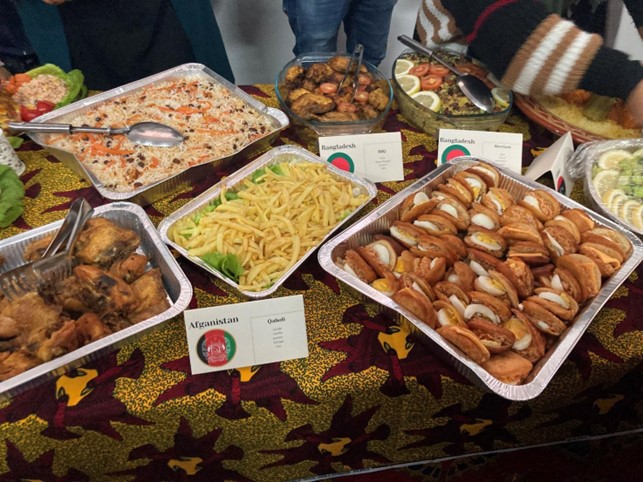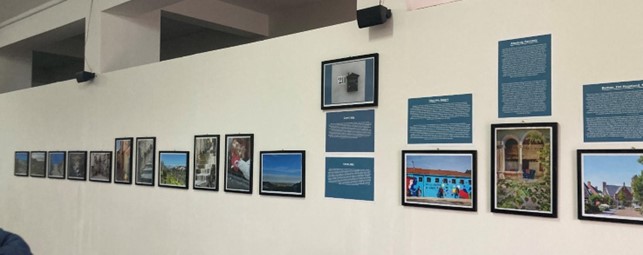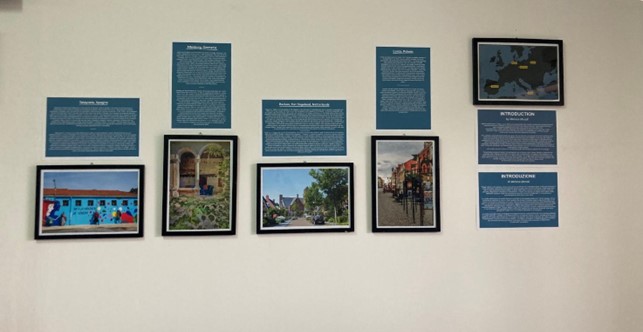A small village with a big heart: Camini roundtable and field visit
The third of the series of field visits and roundtables of the ‘Welcoming Spaces’ brought us to a hilly commune of Camini, in the Italian region Calabria. Located about 50km south of Catanzaro and about 80 kilometres (50 mi) northeast of Reggio Calabria, Camini borders the municipalities of Riace, Stignano and Stilo.

From November 23-27, 2022, a team of researchers from the University of Bologna (Alice Lomonaco, Elena Giacomelli and Chiara Davino) and the University of Utrecht (Jose Ricardo Martins and Jofelle Tesorio) further investigated the success and critical factors of the case study of Camini and the Eurocoop Jungi Mundu cooperative, a material for reflection and analysis together with the other European case studies of the Welcoming Spaces project. Through interviews and direct observations, the visiting researchers collected data from the experiences of the migrants, the residents, and the people behind the welcoming initiatives, including from the officials of the municipality Camini.

On November 26, a roundtable entitled ‘Leaving, Staying, Returning? The role of the imaginary in the relationship between migrations and territories’ brought together the different actors in making Camini a welcoming space, including the migrants themselves. The roundtable was a result of two research projects carried out by the Department of Sociology and Business Law of the University of Bologna: the Horizon2020 project “Welcoming Spaces” and the project financed by the Emilia-Romagna Region “Towards a tourism of roots in Emilia-Romagna: Memories, imaginary, expectations and desires of the emigrants from Emilia-Romagna in Argentina and Brazil for a hospitable journey to discover their origins’. The main objective of the latter project is to investigate the feeling of belonging of the emigrants from Emilia-Romagna and their descendants residing in Argentina and Brazil to Emilia-Romagna and their expectations or habits when travelling to the places of their origins.

The various experiences and expertise of speakers and the audience in the Camini roundtable valorised the different types of knowledge, from academic to social work and from photographer to migrants, allowing the co-construction of a different and new imaginary, anchored in the time and space of a different Europe.
Held at the municipality’s community hall, the roundtable was also participated online by other project partners and speakers. However, a common case in many ‘shrinking areas’, the real challenge for the roundtable in Camini was the internet connection. But at the end, it was resolved, and the face-to-face interactions with the participants and migrants brought many ideas and cultural exchanges, including a long table of multi-ethnic buffet lunch prepared by the families living in the area (see pictures). This proves the richness and cohesion the welcoming village has created in their area.



The roundtable was attended by policy makers, scholars, local actors and representatives of the institutions (Pierluigi Musarò – Coordinator Welcoming Spaces Italia, University of Bologna, Paola Barretta – Associazione Carta di Roma, Karen Urso – University of Calabria, Giulia Galera – Miledù and Euricse, Melissa Moralli – University of Bologna, Ruggero Marra – Councillor for the Environment, Ecological Transition and Youth Policies of Villa San Giovanni, Giulia Sonzogno – Officina Giovani Aree Interne, Marina Gabrieli – National Coordinator of the Project “Tourism from the Roots” of the Ministry of Foreign Affairs, Rosario Zurzolo – President Jungi Mundu, Elena Giacomelli – University of Bologna, Chiara Davino – University of Bologna, Ricardo Martins – University of Utrecht, Keina Espineira – University of La Coruña, Jofelle Tesorio, University of Utrecht, Alice Lomonaco – University of Bologna) contributing to produce new representations on these territories.

Photobook launching
During the Camini roundtable, the photographic project “Connections. Collaborative imaginaries of territories in change across Europe’ (free download at https://issuu.com/melmor23/docs/connections._the_itinerant_book) was also launched through an exhibition. The exhibition presented the stories, photographs and emotional maps created directly by those who are living the everyday life in communities in transformation across Europe. The result is the co-construction of a different and new imageries, anchored in the time and space of a different Europe. The images are full of hope for the future, desire for change, complex encounters, and collective utopias. Some participating ‘community photographers’ also talked about their ideas, feelings, and meanings about the photos they took.



One of the many takeaways learned from this experience in organising is to always include and value the involvement of the community (locals and newcomers) and the place where the event is taking place, especially at the “after-covid19” phase. The in-person events are essential to make a dialogue between different types of knowledge (academic and non-academic) and cannot be replaced by online interactions.
The Welcoming Spaces project aims to address two current political challenges in an innovative way: the revitalisation of Europe’s ‘inner areas’ and the creation of welcoming and inclusive spaces. It involves the Netherlands (project leader), Italy, Germany, Spain and Poland.
Acknowledgments: We would like to thank the entire community of Camini for the warm welcome, the support and willingness you showed on this occasion; for the families in the community who prepared the multi-ethnic buffet, a heart-warming example of the richness and cohesion in this small village with a big heart.

